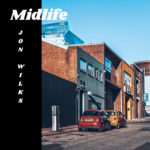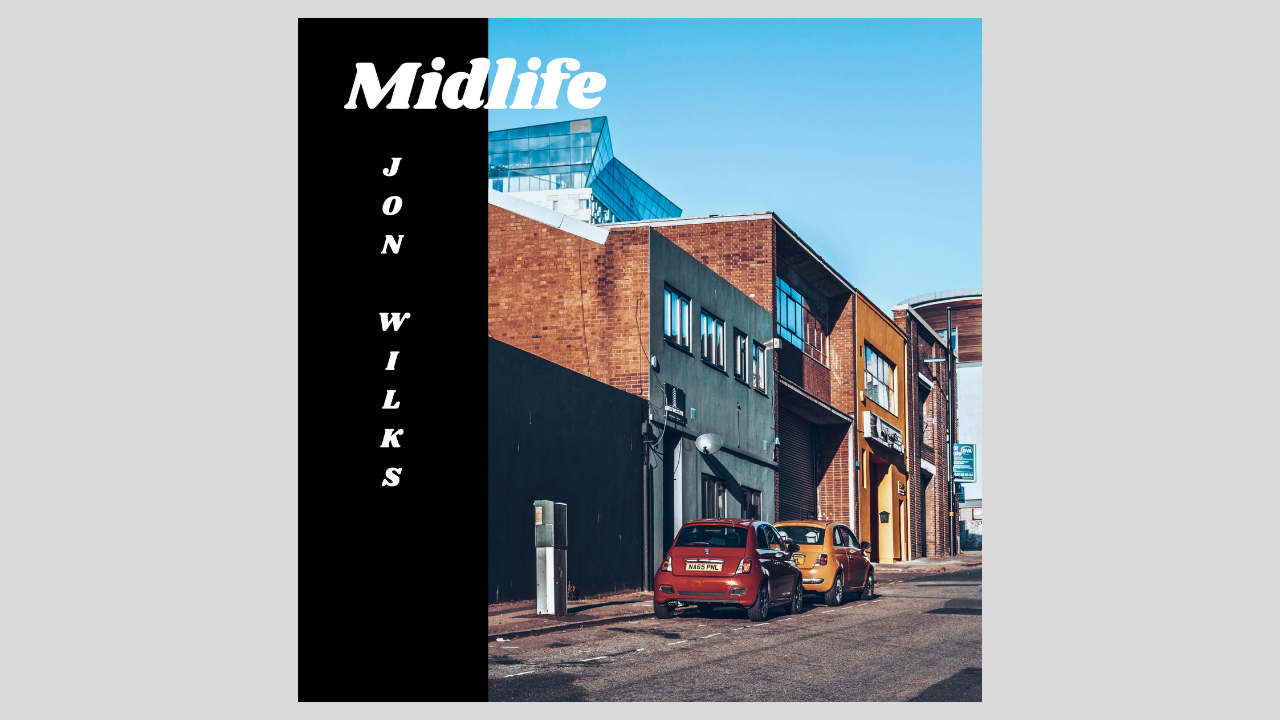PREFER CDS? ORDER THE CD FROM BANDCAMP TODAY
‘Midlife’ is a collection of traditional and music hall songs and tunes from around Birmingham and the wider Midlands. As someone who came of age in Birmingham in the mid-90s and only came to traditional folk music later on, I wanted to filter these songs through my own experience. Some of them are left unadorned – simple fingerpicking folk songs, or even entirely unaccompanied – while others go back to my days dancing to Booker T & The MGs in ‘retro’ and Britpop nightclubs.
Find Midlife by clicking on Bandcamp | Spotify | Apple Music | Google Play | Amazon
The title of the album has to do with entering early middle age while researching it. I’m fairly convinced that my newfound obsession with traditional music and all the things that surround it is a form of midlife crisis – a search for a place to belong. Happily, I’ve really fallen for the trad folk community in a big way. I’ve made some amazing friends that I hope to know until I’m old and can scarcely crawl, and, when all’s said and done, that’s better than spending the family savings on a sports car.
The Brave Dudley Boys (Roud 1131)
According to the late researcher and collector, Roy Palmer, the Dudley Boys were known in the late 18th century for being an unsettled bunch. This song dates to their rioting against high food prices, around the end of the 1780s. Lord Dudley Ward, mentioned in the song, was a pacifier who managed to quieten the Dudley Boys down and call a halt on the advancing soldiers. The tune was added by Pam Bishop in the earlier 1970s and it was recorded for Topic Records on The Wide Midlands, which is where I came across it.
I Can’t Find Brummagem (Roud V34542)
I left Birmingham, a city I once knew like the back of my hand, at the age of 21. Fifteen years later, I went back and visited the Birmingham Museum. I got completely lost on the way. On arriving, I heard a recording of this song, which depicts a man returning to Birmingham and not recognising the place. I rewrote some of the verses to give it a slightly more contemporary story, but the essence of the song is still there. It’s this song that set me on a mission to research and record this album. Not a traditional song, it is thought to have been written by the music hall performer, James Hobbs (1781-1837). He performed it at the Theatre Royal on New Street (now a Bella Pasta) in 1828.
Navvy Boots (Roud 516)
This was collected in Pelsall Common, just north of Birmingham, on October 1st 1967, when it was sung to members of the Birmingham and Midland Folk Centre by a traveller named Eileen Hannoran. Irish in origin, several versions exist, and it’s not unusual to find that it was common in the Midlands area where many labourers worked on the construction of the railways and canals. It’s not a meditation on hard labour, however, and keen-eared listeners will recognise several floating verses common to a number of Night Visiting Songs. I originally found it in Roy Palmer’s book, Songs Of The Midlands.
Birmingham Sally (Roud V254)
Another song I first heard on The Wide Midlands, sung by Chris Richards. A common enough tale of star-crossed lovers, separated by class and the expectations of others. It dates to the early 1800s, when it was included in an anthology called Nelson’s Wreath.
Colin’s Ghost (Roud 1600)
One of several songs, two of which I’ve recorded on this album, that were collected from Mrs Webb of Kings Norton in February, 1906. While it appears that Mrs Webb originated from the Midlands, at the time of the song’s collection, it is thought that she was living in Bath, most probably at the workhouse. Henry Hammond took the song down and it was included in Frank Purslow’s “Marrow Bones”, although it is exceedingly rare in the recorded canon. My own memories of Kings Norton are limited to trips to McDonalds. I have no recollection of seeing any ghosts, although the Colin in this song, as you’ll discover, is hardly paranormal. In fact, what he has in mind is about as normal as it gets.
Aye For Saturday Night (My Bloke’s a Peaky) (Roud 5701 and 24185)
Both of these pieces were collected from the legendary Digbeth singer, Cecilia Costello, in 1967. The first is a rambunctious song full of drink and innuendo, which reminds me of my teenage years drinking in the same area. The second is slightly more interesting, from a historical perspective. Costello’s version was a fragment with no tune, describing the Peaky Blinders street gang, now famous worldwide thanks to the BBC. Costello could recall seeing them as they roamed the streets, and the only verse she could recall from a local folk poem demonstrated their style and their menace. I’ve added a tune so that they can be remembered in song.
John Hobbs & Bandy-Legged Lett (Roud 21966)
The first of two rather sinister songs that deal with the unpleasant subject of “wife selling”, which was so common in the Midlands in the late 1800s that a genre existed around it. I should point out that I’m not endorsing the selling of spouses by exploring these songs. Just as ‘Shallow Brown’ reintroduces us to the heartbreak of those smuggled onto slave ships, these songs give us pause for thought on the harsh fates of those who lived here before us.
That said, there seems to have been a side to “wife selling” that wasn’t quite as sinister as the name suggests. Often, the woman would also be seeking a way out of the marriage, and at a time when divorce was heavily frowned upon, this seemed like a way of getting things done. In fact, records of the time suggest it was common for the woman’s lover to be present at the market to conclude the transaction. Everyone left happily, it seems, apart from the Church, who eventually clamped down on what was deemed licentious behaviour.
The two songs here show versions of both the dark side of this practice and the more frivolous nature. Both are taken from The Urban And Industrial Songs Of The Black Country And Birmingham, edited by Jon Raven.
Buffoon (a Morris tune)
I first heard this tune performed by Paul Hooke on The Wide Midlands (Topic Records). In my younger days in mid-90s Birmingham, I’d often go dancing at Snobs and Sunflower, two nightclubs that played ‘retro’ 60s music – Stax, Motown, mod classics. I figured ‘Buffoon’, a Morris tune collected from Sam Bennett of Ilmington, would’ve been the dancing music of a previous century, so I fed it through my own experience. The result? See for yourself. Here’s what happens when you feed a traditional tune through a Hammond B3 organ…
There Was An Old Man Came Over The Sea (Roud 362)
I first heard this song performed by Lankum, not realising that a version was collected in my neck of the woods. I eventually found it in Roy Palmer’s book, Songs of the Midlands. It was collected by W.H.D. Rouse in 1899, from a chap called G. Hayward, living in Newbold near Rugby.
Rouse was there to watch a mummers play, and, as it came to an end, the individual actors stepped forward and offered up a solo performance. “Each of the players had one or more songs,” explains Rouse, “but most of them were music-hall ditties or the like.” One can only imagine the hushed silence as Hayward stepped up and delivered this decidedly un-festive song, full of forced marriage, forced sex and death. I wonder if Hayward was generally known for being this inappropriate…
Adieu, Adieu (Roud 490)
Collected from the aforementioned Mrs Webb, this song was described by A. L. Lloyd as, “the ace and the deuce of robber songs”. Indeed, everyone who’s anyone seems to have recorded a version of this song, which goes under a myriad of names. It’s a wonderful thing to sing, with a narrative you can really get stuck into and a palpable dignity that floods the song with emotion. Ideal for finger-picking guitarists, too. Something for everyone!
With thanks to…
Several people have been really encouraging in the making of this album. Since it’s unlikely that a physical release will ever get made, I’ll thank them here.
Emi, my wife, isn’t a huge fan of traditional music, but she puts up with it and listens attentively when asked. More importantly, she puts up with it with the patience of a saint. Hana and Kai, my kids, do the same, although anyone who met us at Sidmouth will know that Hana is her own folkie. If anyone’s looking for a 10-year-old with a weirdly large repertoire of traditional English folk songs, give us a call.
Jon Nice, as always, turns up with inspiration and keyboard wizardry whenever asked. Can’t wait to get onto writing another Grizzly Folk album with him this winter.
Ian Anderson has supported so many folk artists over the years, and he’s kindly done the same to me. I hope he eventually gets to retire in peace.
Pam Bishop, a lifelong supporter of traditional Brummie music, was good enough to get in touch and chat about these wonderful traditions, and she wrote the tune to ‘The Brave Dudley Boys’ way back when, so speaking to her thrilled me.
I’ve also taken a lot of inspiration from the kind words of Eliza C, Paul S, Martin S and Jim M (thanks folks). Playing ‘Colin’s Ghost’ to Eliza’s dad in my living room was a particular highlight, especially when he told me he’d known of its existence but never actually heard it. Score!
One important thing to note: Several of the songs on this album were released in the early 70s on an album called ‘The Wider Midlands’ (Topic). I urge anyone who has an interest in Midlands history to seek it out. I couldn’t have done this without the hours I spent absorbing the work that Roy Palmer, Jon Raven, Pam Bishop and Pete Coe did back in those folkish days.
Find Midlife by clicking on Bandcamp | Spotify | Apple Music | Google Play | Amazon
One last thing
 I’m often asked how I’d prefer people to purchase or listen to my albums. The simple answer is that I really don’t mind. I’m not in this to make money – it’s not my job and I don’t rely on the income. I record traditional folk albums in the hope that more people get to hear the songs. Therefore, I have no problem with Spotify and their ilk. In fact, I like the fact that the more people who listen in that way, the more get to hear it (it’s all about gaming the algorithms!) If you would, however, prefer to feel that you’re paying your way, Bandcamp is the best bet as they share more of your hard-earned with the artists that use them. Many thanks!
I’m often asked how I’d prefer people to purchase or listen to my albums. The simple answer is that I really don’t mind. I’m not in this to make money – it’s not my job and I don’t rely on the income. I record traditional folk albums in the hope that more people get to hear the songs. Therefore, I have no problem with Spotify and their ilk. In fact, I like the fact that the more people who listen in that way, the more get to hear it (it’s all about gaming the algorithms!) If you would, however, prefer to feel that you’re paying your way, Bandcamp is the best bet as they share more of your hard-earned with the artists that use them. Many thanks!

Leave a Reply